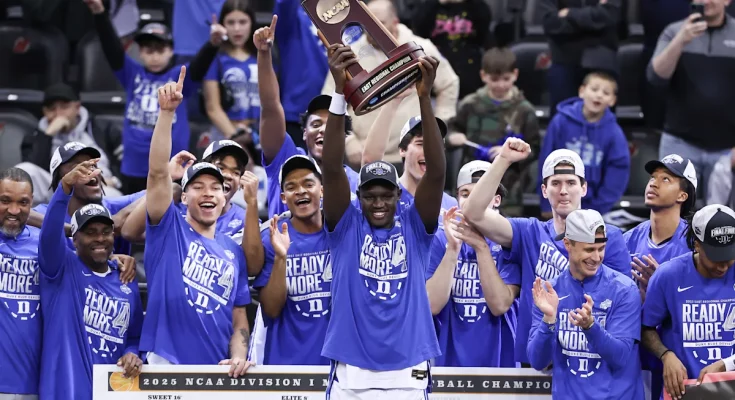All business. That’s the mood echoing from Durham this offseason. As the summer workouts intensify and the echoes of last year’s shortcomings still linger in the halls of Cameron Indoor, Duke men’s basketball is no longer interested in pageantry or pretense. There’s one goal. One mission. One destination. And it’s already in motion: the Final Four. The Blue Devils aren’t making any grand declarations on social media or holding pep rallies about revenge tours. That’s not their style this year. This version of Duke basketball is focused, laser-locked, and grinding. With the coaching leadership of Jon Scheyer entering its third full campaign, a uniquely balanced roster of returning veterans and explosive newcomers, and a deeper-than-usual chip on the shoulder of the program, Duke’s mindset has shifted into something resembling an old-school, workmanlike tone. In other words, this isn’t just another season in Durham. It’s personal.
Last year left a bad taste. The 2024 tournament exit stung deeply, not just because of how it happened, but because of who Duke thought they were versus how they performed under the pressure. The Blue Devils have long held a seat at the table of bluebloods with the expectation that Final Four runs are not exceptional — they’re essential. Falling short is not failure, but it’s a signal. And Duke has received the message loud and clear. The program is moving in silence, but the actions scream louder than words. Player-led practices, relentless attention to detail, and a commitment to internal competition are forming the foundation of a group not interested in accolades until they’ve earned them. Jon Scheyer isn’t trying to chase Coach K’s legacy anymore — he’s trying to build his own era, his own standard, and it starts with a return to college basketball’s biggest stage.
The personnel is aligned for the mission. Duke’s roster, perhaps more than any in recent memory, carries the right blend of experience and elite young talent. Tyrese Proctor’s decision to return was massive. The Australian guard brings more than just points and assists — he brings poise, a high IQ, and familiarity with the system. Caleb Foster, another key returnee, adds backcourt depth, toughness, and the kind of complementary skill set that gives Scheyer flexibility with matchups. Then there’s the frontcourt anchor: Mark Mitchell. With his size, mobility, and improved shooting stroke, Mitchell’s evolution is central to Duke’s hopes of stretching the floor and defending at an elite level.
And then there’s Cooper Flagg. The headliner. The phenom. The face of a new generation of Duke basketball. From the moment Flagg committed, expectations erupted — not just for him, but for the program. He isn’t just the No. 1 prospect in the nation; he’s one of the most complete freshmen Duke has landed since Zion Williamson. But here’s the difference: Flagg isn’t walking into Cameron with a flair for the dramatic. He’s bringing his lunch pail. From early glimpses in team workouts and overseas scrimmages, Flagg is less interested in highlight reels and more focused on winning every possession. His game is polished, sure. His instincts are elite. But it’s the mindset that sets him apart — a mindset that’s already embedded into Duke’s team culture this year.
Flagg is joined by a freshman class that reads like a lottery board. Isaiah Evans, a long, wiry scorer with the kind of range that can stretch a defense to its limits. Khaman Maluach, the towering South Sudanese big man who brings an intimidating shot-blocking presence and surprising fluidity for his size. Darren Harris, a sniper from beyond the arc with a silky release. And Kon Knueppel, the ultra-versatile, highly cerebral forward whose feel for the game defies his age. What makes this class unique isn’t just the talent — it’s the buy-in. Every one of them could have gone somewhere and been the star. But they chose Duke knowing they’d have to share the spotlight. That’s not coincidence — it’s culture.
Jon Scheyer is molding something different now. In his first season, he was handed the keys to a Ferrari and asked to keep it on the road. He did that. Last year, he faced adversity, inconsistency, and the reality of trying to manage expectations with a roster that struggled to find its identity. This season, there’s no more guessing. He knows what works, what doesn’t, and most importantly, he knows what kind of player fits his system. Scheyer has recruited for skill and toughness, not just stardom. He’s constructed a roster with versatility in mind, guys who can guard multiple positions, handle the ball, and make the right read. The practices reflect that. They’re competitive, sharp, physical. There’s no room for ego this year. Only execution.
That execution is being demanded in every corner of the program. From strength and conditioning to film study, there’s an unrelenting pace to Duke’s preparations. Summer sessions aren’t about building chemistry — they’re about testing resolve. Who dives for the loose ball? Who stays after practice to get shots up? Who leads when no one’s watching? These are the questions shaping the internal hierarchy. And the answers thus far suggest Duke’s locker room is healthy, hungry, and held accountable. There’s not a single player on this roster satisfied with preseason hype. They’re aiming for April.
The external noise has never really disappeared. Pundits are once again putting Duke in the early Final Four projections. NBA scouts are camping out at practices to get early reads on Flagg and his fellow freshmen. Social media is abuzz with every video clip of a practice dunk or step-back jumper. But none of that is penetrating the inner sanctum. There’s a reason nobody in the program is giving interviews about chasing a title. They’re not chasing it — they’re working for it. The only thing Duke is interested in proving is to themselves. Every sprint, every set, every rep — it’s all business.



